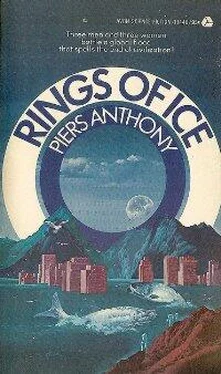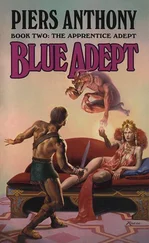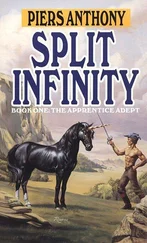“Floy told me.”
Zena suffered a flash of anger. “What did Floy tell you?”
“We’d better get back.”
“She told you that?”
“No.” Verbal plays were still wasted on him; he always answered literally. “But it isn’t safe for you to stay out here.”
“What did she tell you?”
He paused, but then answered. “That you love me.”
Zena clenched her teeth. Why couldn’t she have said it herself? Was it really easier to get pregnant by a man, than to tell him she loved him?
“I know the way back,” Thatch said.
She went with him, wordlessly.
Karen was haggard. Her normally rounded body had turned gaunt, though she ate reasonably and drank insatiably. She seemed drowsy and very tired, and her breath smelled fruity. Often she retreated to the bathroom to urinate copiously—then gulped more water. This aggravated Zena almost intolerably, but she knew its cause and kept silent. The water was needed to dilute the rampant sugar in her blood—the sugar that could not get to the cells of the body where it was so badly needed. The diabetes was now uncontrolled, for the last of the insulin was gone.
Gus was now alarmed. “Snap out of it, Karen! Can’t I help you?” he asked plaintively, again and again.
Karen only shook her head. Her breathing was deep and labored, and her skin was flushed yet dry. She seemed to have aged, and not graciously; her beauty was gone.
“I’m going out and find some insulin,” Gus said, marching to the door. But there he stopped, balked by his fear of the rain. And as he paused uncertainly, there was a violent shudder in the ground that rattled the plates on the table and made everyone jump.
“Another fissure opening up,” Floy said. “Maybe a volcano.”
“Ridiculous!” Zena said. But it wasn’t really. Not any more. With the enormous pressure of the sea water building up, and the erosion of the counterweight of soil and gravel, intolerable stresses were building. The world, like Karen, was sick; like her, it was developing awful symptoms that seemed paradoxical.
Gus still stood by the door. “You can’t go out,” Zena told him, feeling like a hypocrite for justifying his inability to act. “Where in this flooded world would there be any insulin?”
There was another shudder, and this time they heard the boom of some great explosion. “ Must be a volcano,” Floy said. “Crack Toe.”
Gus turned. “You mean Krakatoa.”
“Right. Crack Toe,” she repeated. “Smithereens.”
Even Karen smiled, wanly.
“It can’t make very much difference to us,” Zena said, though she knew that she was being unduly pessimistic, as they should be able to survive the rain, provided the tremors did not dump them all into a crevasse. But with Karen dying…
Karen rested quietly for a time. Then she sat up and vomited. Zena stifled her own nausea and cleaned up as well as she could. Another earth tremor made her take a spill, so that she had to do the job twice, but that seemed fitting. Maybe the world itself was sharing Karen’s suffering.
But the patient saw it another way. “You’re making me suffer,” Karen muttered as the heaves abated. “Just a little pressure on the carotid arteries—you know where to do it, Zena.”
“No!” Zena cried.
“Painless, out like a light,” Karen continued weakly. “After that, it doesn’t matter how. Cut my throat, catch the blood in a basin—”
“God!” Gus said.
“You’d be doing me a favor. And the meat would be better. It’s spoiling right now.” She took a breath. “Promise me you won’t waste the meat.”
“We won’t,” Zena said.
At last Karen lapsed into a tortured sleep. So did the others: it had not been possible while the woman agonized.
The loud rain continued—and so did the booms of the burgeoning volcano. Once Zena got heaved onto the floor, and the entire bus shifted position alarmingly. Zena merely crawled back onto the bed and slept again.
When she woke, someone had covered Karen’s face with a sheet.
“It is time to take her out,” Floy said.
Thatch stooped to pick up Karen’s body. “Let her be!” Gus said.
Thatch hesitated. “No,” Floy said. “She wanted it as it was with Gordon. To help the group, to preserve the baby. It would not be right to waste her. And we promised.”
“That’s right,” Zena agreed grimly. “I’ll help. It must be done.”
“Not with her!’ Gus protested, his body shaking. “I love her!”
“I loved Gordon,” Floy said. “But I ate him.”
Thatch made another motion to pick up the body. Gus lunged to stop him—and Floy leaped on Gus. He cried out in pain. Two bloody streaks appeared across his forehead. “Thatch!” he screamed. “I’m hurt!”
Zena put a hand on Thatch’s shoulder. “She knows what she’s doing,” she murmured. She remembered how Floy had refrained from fighting, when Zena herself had challenged her; that had been judgment, not fear.
Thatch looked back and forth indecisively. “Gus—”
“Gus can’t keep a corpse in here,” Zena said. “He needs a woman.”
Thatch looked at Floy. The girl was lean and hollow-eyed from her own mourning. Her hair was long and wild, and her claws were showing. She was like a hungry tigress, but her dynamism gave her a certain sex appeal. And Gus had always had a certain hankering…
“And I need a man,” Zena said. “I think I could love a man. An independent man.”
Still Thatch hesitated, unable to break his long symbiosis with Gus. It was this more than anything else, Zena realized, that really stood between herself and Thatch. A physical homosexuality would have disgusted her; this emotional mutualism acted more subtly to inhibit other attachments.
At last Thatch nodded. He bent again to pick up the body. “Thatch!” Gus cried again, but Thatch ignored him. He hauled Karen’s corpse off the couch and down the hall toward the door.
Gus tried once more to interfere, but halted as Floy came at him. “I can do what she did,” Floy said. “I know how you feel. I’ve been through it all.” She spoke with a low intensity that showed she meant it.
They got the body outside. Zena glanced back, unable to restrain her morbid curiosity. Gus and Floy were already on the back couch, in an embrace of antagonism or of passion. Probably some of each—but it was what was required at that moment.
The rain blasted down, instantly matting the hair over the dead woman’s face and obscuring visibility. “That girl’s got courage,” Zena said. Actually she was yelling, to get over the noise of Mindel.
“So have you,” Thatch called back.
He dumped down the body. Zena couldn’t even tell whether it splashed, because everything was a splash out here. She had the sheet, and now laid it over the face.
Thatch drew his knife. Zena held Karen’s hair tightly while Thatch cut around the neck. The sheet concealed the sight of what they were doing, and the rain washed away any blood there might have been before it showed. It should not have been wasted—but there were limits.
“So have you,” Zena said, averting her gaze anyway.
“She showed me how,” he said, misunderstanding her comment.
There was another tremor, a violent one. The corpse jumped into the air. Zena screamed involuntarily, and Thatch jerked back. His glasses flew off his head; they had been anchored by a chain around the back of his head, but this must have broken.
Even through the thick rain they saw it: the flare of Crack Toe letting go. The falling water turned red, and Zena thought she saw a halo from the refraction. Then the sound came, as of a mountain being torn apart.
Читать дальше










